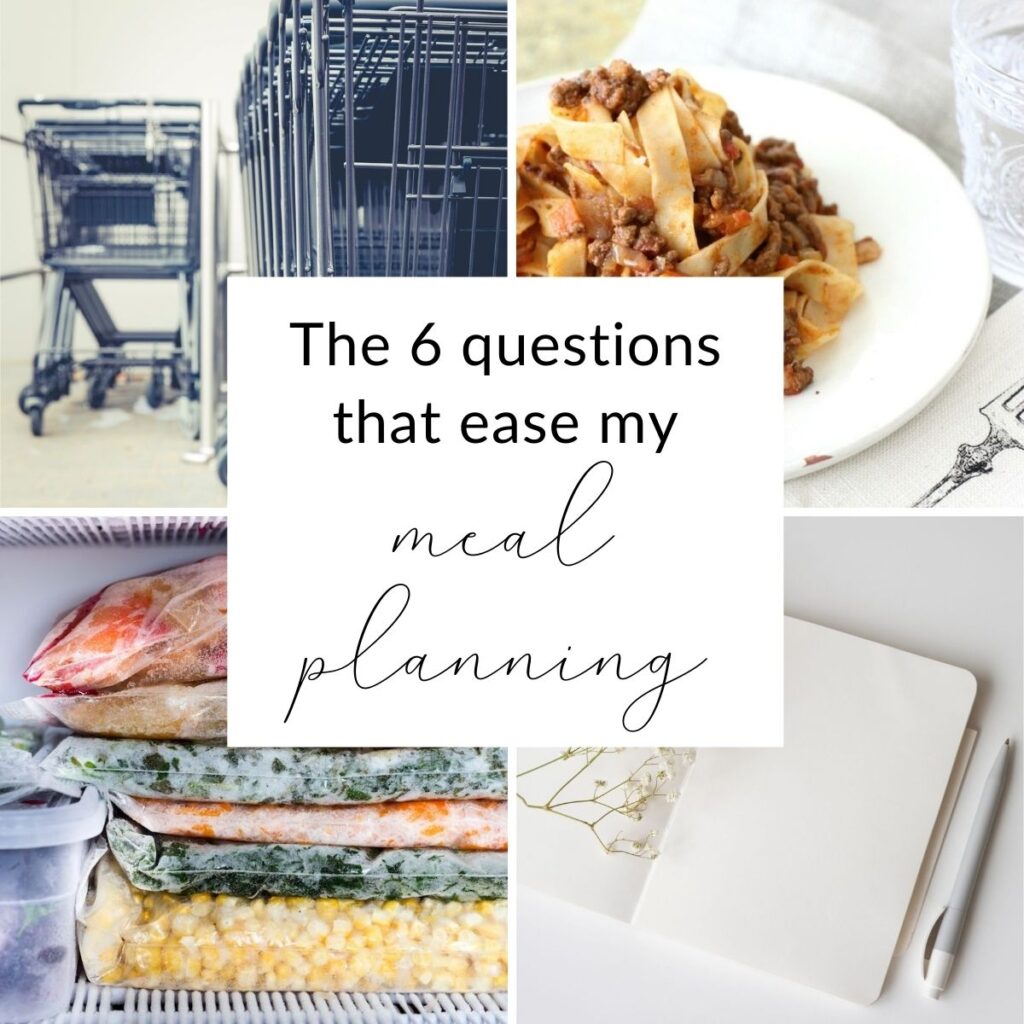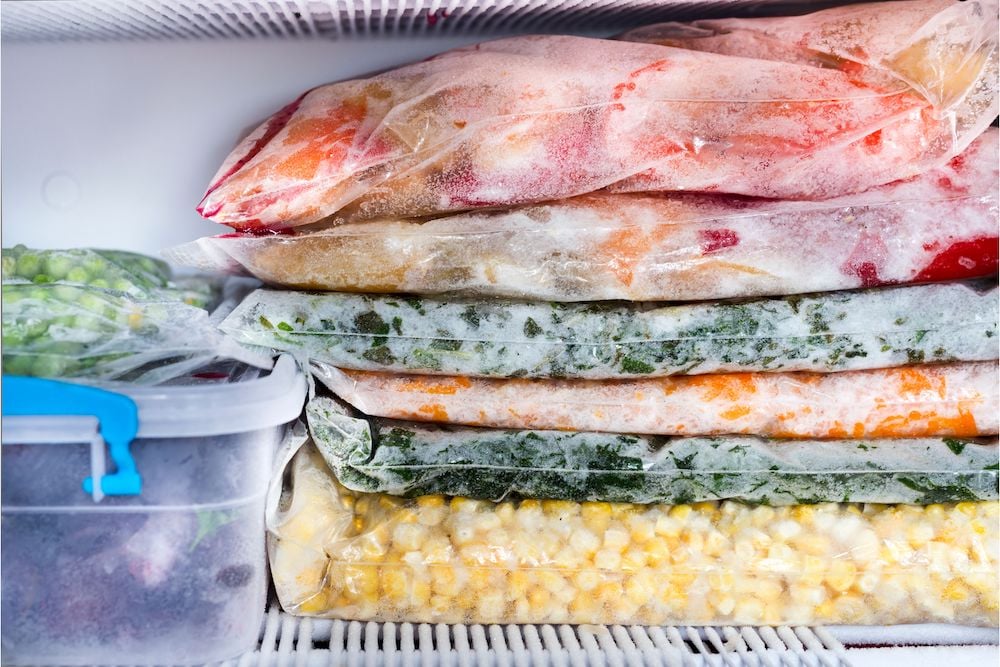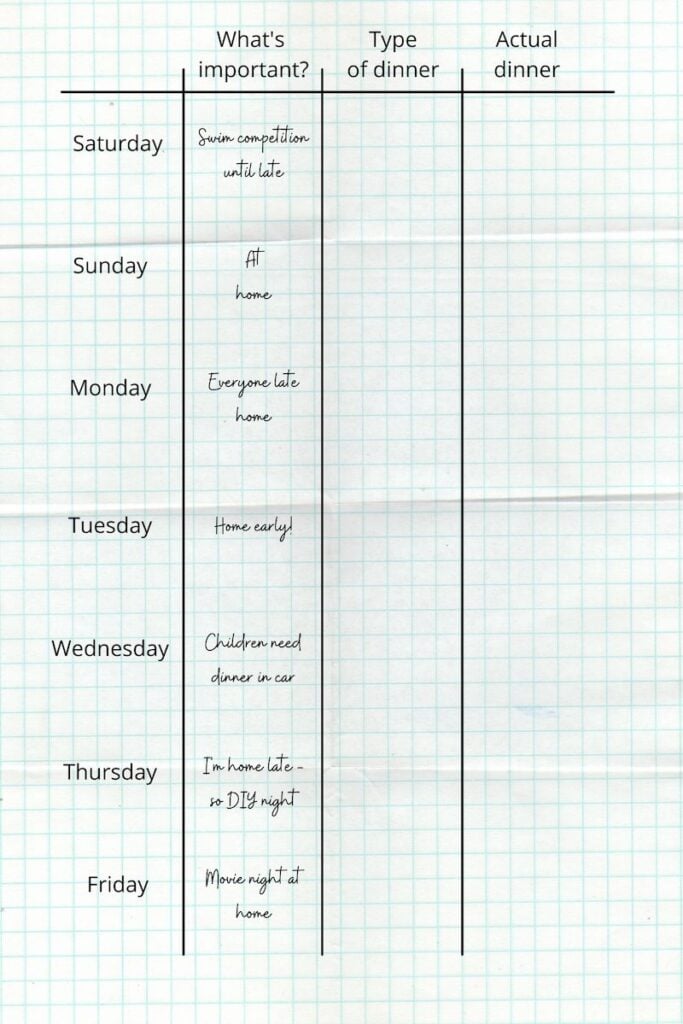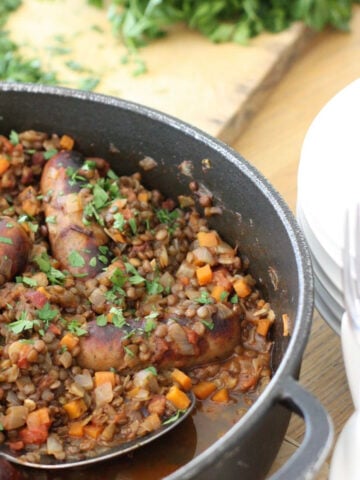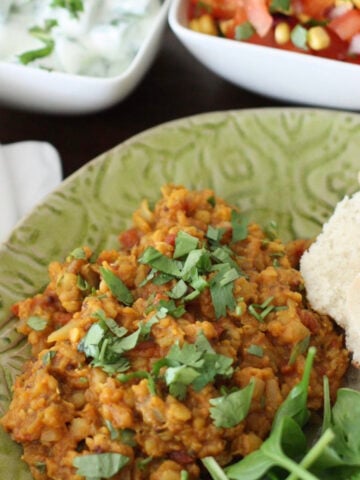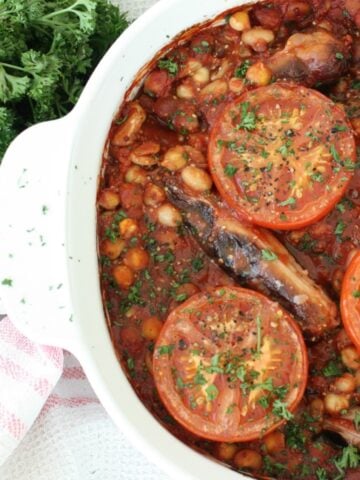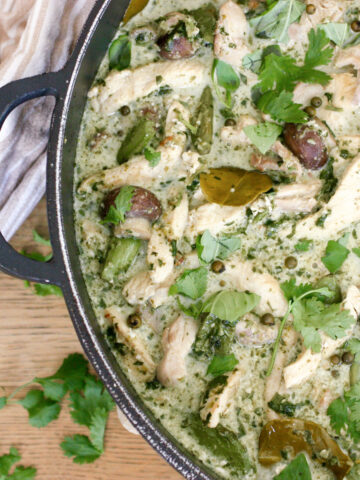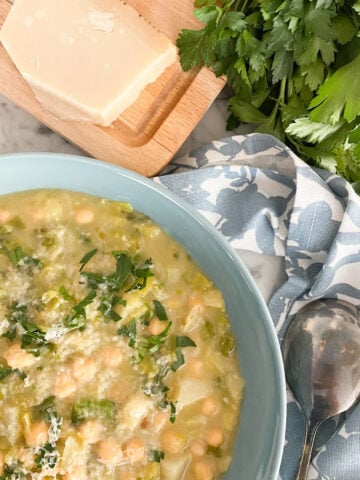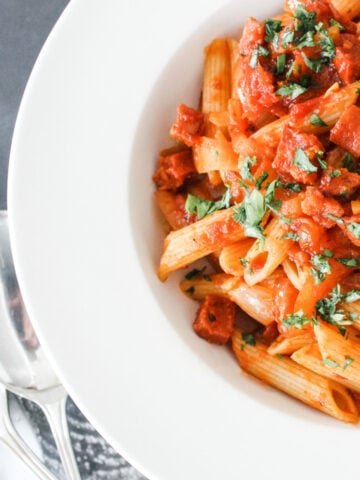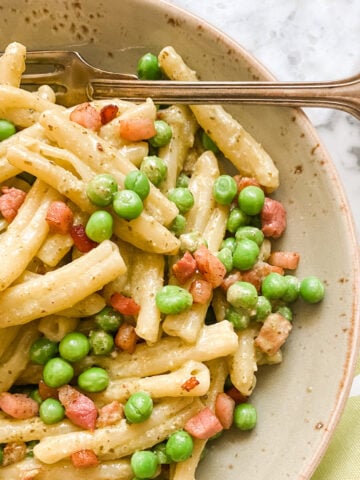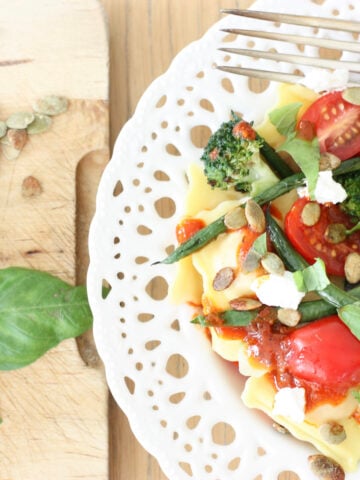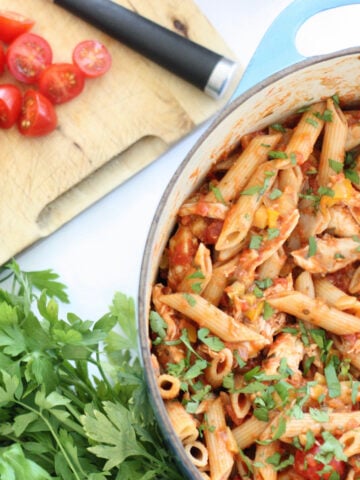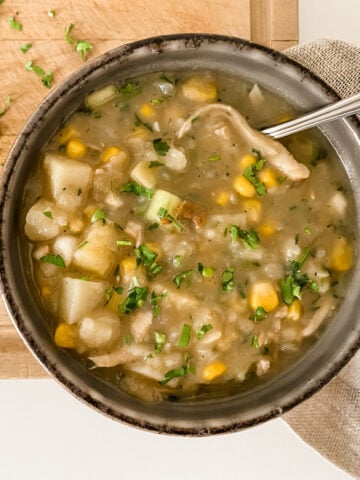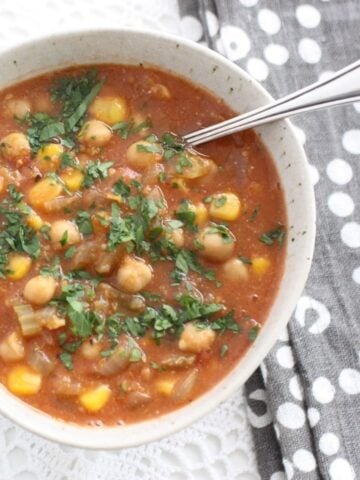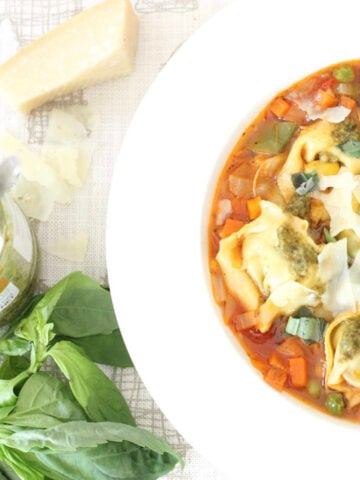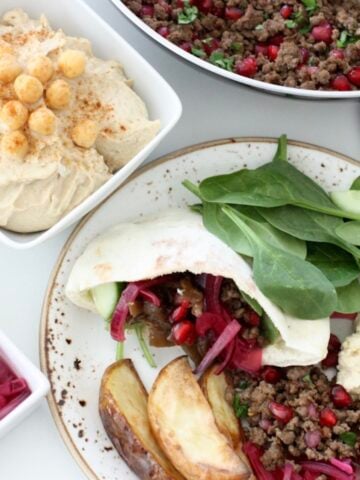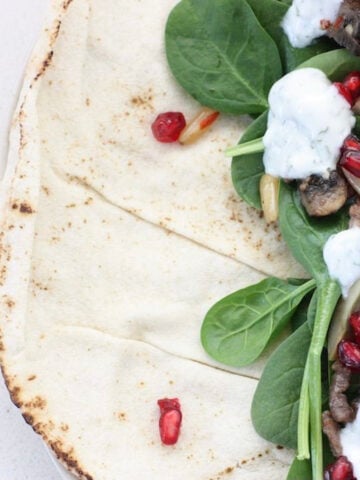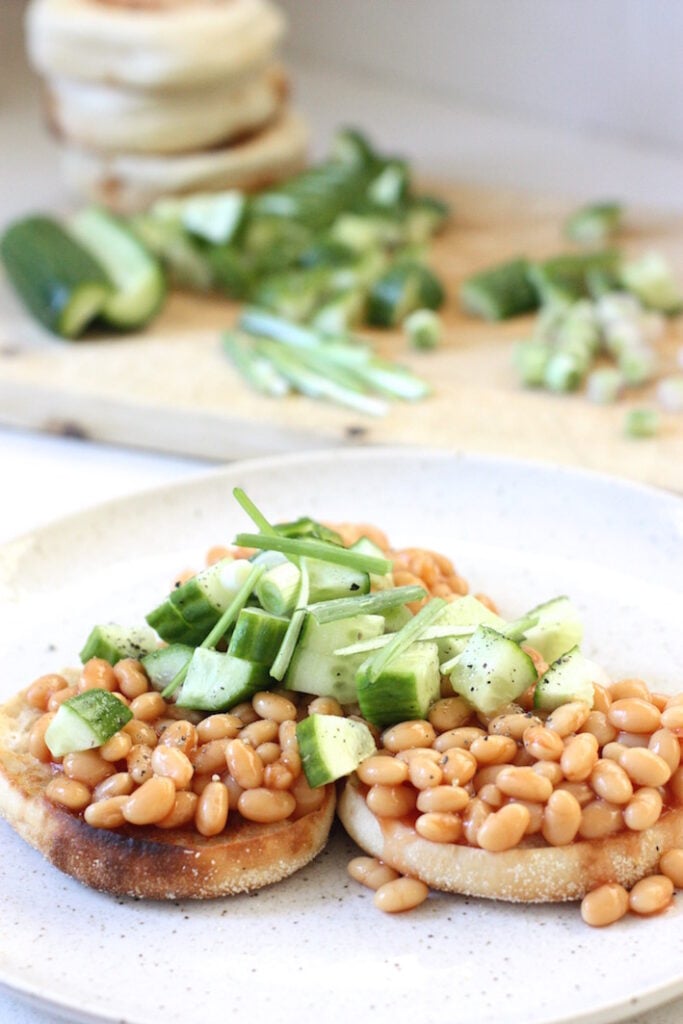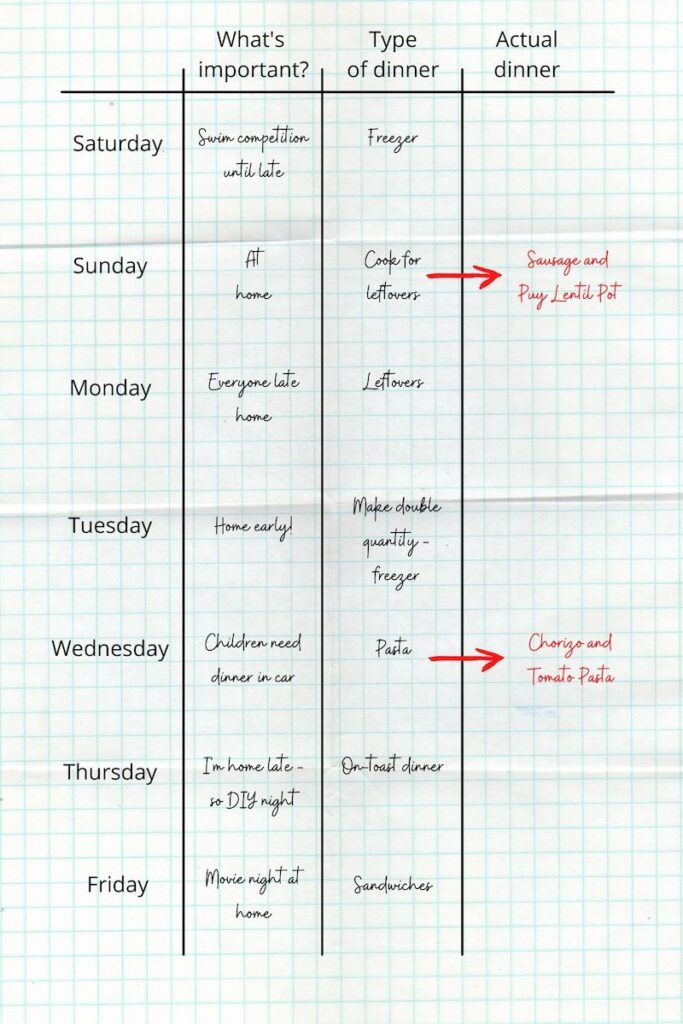A lot of the time, it feels as though the mental effort required to start something new or, indeed, to get back into doing something, is much greater than the mental effort required to actually do the thing. I am definitely guilty of this - inflating a looming task until it feels huge and unwieldy and, quite frankly, bears no resemblance to the magnitude of the actual thing I’m trying to do. Some examples - returning to the gym after a long break; rediscovering the structure of only drinking at the weekend after the Christmas back-to-back festivities; embracing a rhythm of meal planning when I've been breezing through the kitchen and living free and easy for the past few weeks.
And if starting some meal planning or a return to meal planning has also been on your mind but you’re struggling to get it together, I’d like to introduce you to my 6 question approach to meal planning - let’s think of it as ‘baby steps’ because easy does it.
There are no charts here; there are no boxes to fill in; there is no frantic batch cooking - this is an approach that works for me and is based on the principle of identifying what’s important in the upcoming week and using that to guide your planning.
So, why do I do it this way round?
It seems to me that the pressure to come up with ideas, day in day out, is what makes meal planning at best feel like a chore and at worst something to be avoided at all costs. Starting with a blank page on anything is grim and, in this approach, there are 3 key questions that I ask myself before I even start to look ominously at that empty, white page of doom.
the pressure to come up with ideas, day in day out, is what makes meal planning at best feel like a chore and at worst something to be avoided at all costs
So, here we go friends … if easing into meal planning feels like it might be good for you and your life, some or all of these questions might be helpful. But first, let’s lightly touch on the ‘why’ of meal planning …
Why do I bother meal planning?
For me, knowing roughly what I'm going to cook for the week keeps me sane and ensures that I'm not shopping for food every day. I expect it also means that I spend less money and I definitely waste less. And when life gets frantic or heavy, taking the guesswork out of the daily dinner decision is one less thing to think about. Oh, and it limits emergency dinners (ie a bag of crisps and a Magnum ice cream) to occasional occasions!
Which meals do I plan?
Breakfast during the week is based on a DIY approach, so no need to plan for that and packed lunches follow a rhythm that is fairly predictable so no drama there either. I focus on dinners for my planning (with leftovers often forming part of the packed lunch offering the next day).
So, let’s start with an overview, to get the meal planning party going.
Here are the 6 questions that I ask myself –
- Is this the right time for meal planning?
- What ingredients do I already have?
- What is important this week?
- What TYPE of dinner will work for each day?
- What ACTUAL dinner will we have each day?
- What additional ingredients do I need to buy?
And now, let's dig a little deeper -
QUESTION 1 - Is this the right time for meal planning?
What I know about myself is that my urge to plan the meals for the week shows up at that point in proceedings when I’m craving that feeling of being on the front foot, being ‘ahead of the game’. Mostly it hits at the start of the week, but sometimes it’s as I edge towards the weekend. What I have also learned from experience is that meal planning works best when I'm not feeling pulled in many different directions; I've not just staggered into the house after a long, busy day; I need to be at least a little bit ‘in the mood’. And if there is no time that feels like the right time, then go easy on yourself and just plan 2 or 3 dinners for the week. That might be all you need in order to start to find your rhythm. Overwhelm is not helpful here..
So, to recap – choose a good time to tackle your meal planning. And if no good time exists, expect less of yourself.
QUESTION 2 - What ingredients do I already have?
This is where you look inside your fridge, freezer and cupboards to work out what you already have in stock and to identify what needs using up. Jot down what you have in 3 sections –
- Fridge
- Freezer
- Cupboards
If you are hoping to spend less, waste less and visit the supermarket less, knowing what you have and using what you have is essential. It’s the contents of the freezer that is most likely to be filled with mystery, so try creating a thorough list of its contents every now and then - crossing things off as you use them. Yes, I know, this is not very 'rock n roll' but think of the money you’ll save by using what you have, rather than just buying more and more.
So, to recap – know what ingredients you have, so that you can use what you have.
QUESTION 3 - What is important this week?
Spoiler alert; this is my favourite question! When you know what’s important in the week ahead, this can really help to inform your meal plan, so pull out your calendar, take a look at your schedule and think about what is big and what is coming up in the next few days. This is when it’s important to be REALISTIC, you are doing meal planning for your ACTUAL life, not your DREAM life – expecting to make a home-cooked meal from scratch every night during a week when you know that you will be run ragged is setting yourself up for disappointment and possibly some self-beating. Don’t go there.
This is when it’s important to be REALISTIC - you are doing meal planning for your ACTUAL life, not your DREAM life!
Here are a few examples of the sorts of things that might be important in your week –
- Teenage exams
- Sports fixtures
- First week back at work after the holidays
- Joe’s birthday
- Prep for big meeting and then actual meeting
- Monday night – everyone will be late home
- Wednesday – children need dinner in the car
- Friday – family movie night
And there might be other things that are also important, such as –
- Spend as little as possible this week
- Need to use up all those tomatoes
- Want to have at least a couple of vegetarian dinners
So, to recap – consider the bigger picture of your week and your family and identify what’s important. It’s much easier to make a plan when you know what you’re working with. And be realistic – the aim here is to make life feel a little calmer and also more well-nourished, not to be crowned the lastest domestic goddess.
QUESTION 4 - What type of dinner will work for each day?
Starting off by matching a ‘type’ of dinner to each day in your plan, is a great place to begin. A lot of the time, we might already do this subconsciously – ‘everyone will be late home, so something on toast would be good’; ‘the children need dinner in the car, so I’ll make pasta’. See what I mean?
When we deal in 'types' of dinner before getting specific, this can be helpful for inspiration – the jump from a blank page to Chorizo and Tomato Pasta next Wednesday is huge but getting from blank page to Wednesday to ‘children need dinner in the car‘ to ‘pasta would work’ to ‘I’ll do Chorizo and Tomato Pasta’ is somehow gentler. Baby steps.
My dinners broadly fit into these ‘types’ –
- The dinner that takes a while to cook but creates plenty of leftovers
- The leftovers dinner
- The dinner that lends itself to a double quantity and freezes well
- The dinner from the freezer
- The pasta dinner
- The soup dinner
- The sandwich dinner
- The on-toast dinner
- The meal subscription delivery service dinner
- The takeaway dinner
- The 'let's go out' dinner
These are the 'types' that work for me but there are no rules here, so don't be put off if any of these make you cringe - take what's useful and ditch the rest. Now, let's dig in a bit more ...
1. The dinner that takes a while to cook but creates plenty of leftovers –
You need time on your hands for this. It might be something that you tackle at the weekend or when you want to disappear alone into the kitchen for a while. And if you are committed to having leftovers remaining, perhaps put them to one side before you start serving up that night's dinner - I've learned this the hard way.
Advantages –
- Sense of achievement
- Leftovers the next day
Disadvantages –
- Requires time and inclination
2. The leftovers dinner
All the hard work has been done already. You could even plate it up the night before so that dinner just needs zapping in the microwave.
Advantages –
- It’s akin to having a night off
Disadvantages –
- There are apparently people who ‘don’t do leftovers’. Madness.
3. The dinner that lends itself to a double quantity and freezes well
Again, this often requires a bit of time, but it may not all be 'hands-on' time. In order to be able to lean on the freezer to help you through the week, this kind of dinner is helpful. The secret smug feeling as you stash the portions into the freezer is definitely the best part.
Advantages –
- You’re doing the work now to reep the benefit later
Disadvantages –
- You need enough freezer space to be able to accommodate your hard work.
4. The dinner from the freezer
Everything is included here; frozen pizza; ready meals; leftover bits of curry from last week’s takeaway and also those beloved double quantities that you cooked for your future self (see point 3). Enjoy!
Advantages –
- It’s easy, easy, easy
Disadvantages –
- Don’t forget to defrost in advance, if it’s required
5. The pasta dinner
Always a crowd-pleaser and it’s great for leftovers to feed into lunch for the next day - although, once again, put enough for lunch to one side before serving dinner. Otherwise it might end in tears.
Advantages –
- Tends towards family dinner harmony
- Requires little time or culinary vision
- A great one for introducing teenagers to cooking for the family
- Can be made more exciting with store cupboard goodies like olives and chorizo
Disadvantages –
- Not sure there are any …
6. The soup dinner
As soon as you eat something out of a bowl with a spoon, life seems like a kinder place, don't you think? Plus, soup promises so little, yet delivers so much. Just add bread, or toast or a sandwich.
Advantages –
- Easy, tasty, nutritious, satisfying, well-behaved
- A perfect solution to a hungry family all arriving home at different times
- Lends itself to a food flask for dinner on the go or leftovers the next day
Disadvantages –
- Possibly more popular in the autumn and winter
7. The sandwich dinner
A well put-together sandwich can be the ultimate brainless crowd-pleaser. It can also be both speedy and simple and with the addition of some Easy Oven Chips and a chilled drink can create the perfect TV dinner.
Advantages –
- Can be eaten standing up, hovering at the kitchen worktop or in the car
- Embracing the spirit of leftovers (ie shoving everything into a sandwich) can be a winner of a frugal dinner too
Disadvantages –
- Some might say sandwiches are just for lunch. Don’t knock it until you’ve tried it, I say
8. The on-toast dinner
There's something very homely and comforting about anything on toast. We do beans on toast (always with a topping of chopped cucumber and spring onions), roasted tomatoes on toast (I cook them earlier if there's time and then warm them just before we are ready to eat.) Let’s not overlook mushrooms on toast - surprisingly satisfying I find and there's always eggs of course, whichever way you like them. The other day we had a completely delicious variation - scrambled eggs, topped with some leftover stir fry vegetables (from the night before), a little torn smoked salmon and a sprinkling of spicy pumpkin seeds. Could catch on.
9. The meal subscription delivery service dinner
Have you ever tried this? You choose your dishes and name when you want the ingredients to be delivered to your home. Then all you have to do is the cooking part.
Advantages –
- Removes the need to do dull food shopping
- Cuts down on waste
- Great way to ease family members into cooking dinner
- Introduction to new recipes
- Ideal when you know that the whole week will be crazy and you can use this service to outsource all the time consuming bits
Disadvantages –
- Possibly expensive, but I’m unconvinced of that, to be honest, particularly when you factor in the reduction in waste
- Perhaps less available in some locations
10. The takeaway dinner
Sometimes a takeaway is the only answer. Takeaway leftovers make perfect weekend snacks for starving children too.
11. The 'let's go out' dinner
When you’ve seen enough of your own kitchen, enjoy being looked after by someone else. You’re worth it.
So, to recap – begin by identifying the 'type' of dinner that works best for each day in your plan. You might do this subconsciously anyway, but including some intention might make it easier to complete the plan for the days where the actual dinner solution doesn't come so easily. And let's not forget, the 'types' of dinner that I've detailed here are those that work for me - yours will be different and that's great. PS If you have any fantastic ones that I'm missing, do shout ...
QUESTION 5 - What actual dinner will we have each day?
And so now you just fill in the gaps with actual dinners. You’ll have your own repertoire and your own favourites and hopefully having made the decisions on the types of dinner will ensure that the ideas for actual dinners present themselves more easily. Go on, give it a try.
QUESTION 6 - What additional ingredients do I need to buy?
And then it’s time for the shopping list, my least favourite part, I will admit but arguably as important as the rest. Don't forget to factor in what you already have in stock and remember to take the list with you, if you do your shopping in real life!
So how was that? As always, take what’s useful from my suggestions and bypass the parts that don’t suit you.
Here are the key meal planning ideas to take away -
- Taking the guesswork out of the daily dinner decision is one less thing to think about when life is busy.
- Choose a good time to tackle your meal planning. And if no good time exists, expect less of yourself.
- Know what ingredients you have, so that you can use what you have.
- Identify what’s important in the week ahead - this can really help to inform your meal plan. But also be REALISTIC, you are doing meal planning for your ACTUAL life, not your DREAM life!
- Start by identifying the 'type' of dinner that works best for each day in your plan. You might do this subconsciously anyway, but including some intention might make it easier to complete the plan for the days where the actual dinner solution doesn't come so easily.
- And then fill in the gaps in your plan with 'actual' dinners.
- And finally, write your shopping list, remembering to factor in what you already have in stock and remembering to take the list with you, if you do your shopping in real life!
Even if only one of these ideas turns out to be useful in your world, then that sounds like a win. Not everything is for everyone but if creating meals falls into your area of responsibility, you may find that having a plan will improve your week no end. Every little bit helps. Happy planning!


